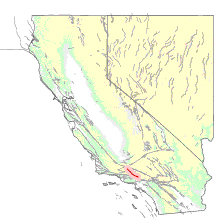This is an old revision of this page, as edited by Evrik (talk | contribs) at 01:38, 31 May 2007 (←Created page with ' right|thumbnail|View of the San Gabreil Fault The '''San Gabiel Fault''' is a geological fault that forms the bo...'). The present address (URL) is a permanent link to this revision, which may differ significantly from the current revision.
Revision as of 01:38, 31 May 2007 by Evrik (talk | contribs) (←Created page with ' right|thumbnail|View of the San Gabreil Fault The '''San Gabiel Fault''' is a geological fault that forms the bo...')(diff) ← Previous revision | Latest revision (diff) | Newer revision → (diff)
The San Gabiel Fault is a geological fault that forms the boundary of the southern portion of the San Gabriel Mountains and running about 87 miles (140 kilometers). The fault is a right-lateral strike-slip that was last active 1,000 of years ago (Late Quaternary west of intersection with the Sierra Madre fault; Quaternary east of that intersection; Holocene only between Saugus and Castaic). It extends southeastward from Ridge Basin to the western San Gabriel Mountains.
Southern and northern segments
| This section needs expansion. You can help by adding to it. |
It was once part of the San Andreas Fault, and is believed to be the former path of the San Andreas. It is also believed that the northwestern end of the fault zone meets the current San Andreas Fault beneath the Frazier Mountain Thrust (near the juncture of the San Andreas with the Garlock and Big Pine Faults).
Activity in the San Gabriel Fault
The San Gabriel moves at a rate of between 1 and 5 millimeters a year, with an average slip of around 3 millimeters.
See also
External links
- http://geomaps.wr.usgs.gov/socal/geology/inland_empire/ie_san_gabriel_fault.html
- http://aapgbull.geoscienceworld.org/cgi/content/abstract/46/10/1938
- http://www.data.scec.org/fault_index/gabriel.html